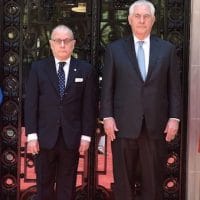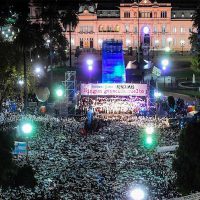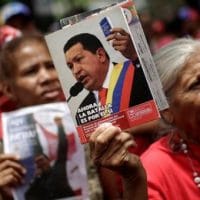-
U.S. and Argentina threaten to ban Venezuelan oil
U.S. Secretary of State Rex Tillerson is threatening to ban the import and export of oil and crude products from Venezuela into the U.S. to pressure President Nicolas Maduro to “return to the constitution.”
-
Argentina: memory, unity and mobilization is the recipe to make Macri Retreat
May Square was, once again, the containment wall under the umbrella of the human rights organizations, which beyond their lamentable divisions, are the only reference that all great majorities respect. Precisely because when the society was muted by terror, from there emerged the first voices of pain, anger and decision so that impunity would not keep advancing. And these organisms exists because previously thousands of patriots fought in any possible way for a society without exploited people. Now Macrism is trying to vanish -for a second time- the legacy of this militancy that since 1955 and on, struggled against the dictatorships and fought for the Revolution.
-
Standoff in Venezuela
Venezuela has been rocked in recent weeks by almost daily protests and counter-protests, as right-wing opponents of socialist President Nicolas Maduro seek to bring down his government.
-
The Challenge Before the Latin American Left
The Left upsurge in Latin America appears to be abating. In October 2015 Jimmy Morales, the conservative candidate in Guatemala, defeated the Left-leaning Sandra Torres in the presidential elections. On November 22, Mauricio Macri, the conservative presidential candidate in Argentina, defeated Daniel Scioli, his Peronist rival, by a narrow margin, to bring to an […]
-
Debt Trial of the Century: NML Capital, LTD. v. Republic of Argentina
“The Third World Network and Jubilee are partnering today to stand up against vulture fund activity, stand up for Argentina, in this incredibly important court case that has massive repercussions for all countries around the world to be able to protect themselves from this kind of litigation in the courts by holdout vulture funds. […]
-
Argentina and the Magic Soybean: The Commodity Export Boom That Wasn’t
One of the great myths about the Argentine economy that is repeated nearly every day is that the rapid growth of the Argentine economy during the past decade has been a “commodity export boom.” For example, the New York Times reported last week: Riding an export boom for commodities like soybeans, Argentina’s economy grew at […]
-
Sweetened Realities that Fade Away
I was surprised today when I listened to the speech delivered by Jose Miguel Insulza in Cartagena. I thought that the person who was speaking on behalf of the OAS would at least claim some respect for the sovereignty of the peoples of this hemisphere which were for years colonized and cruelly exploited by colonial […]
-
Chile Joins Brazil, Argentina, Uruguay, and Bolivia in Recognizing Palestinian State
Chilean government spokeswoman Ena Von Baer declared on Tuesday that her country “supports the establishment of a Palestinian state.” With this declaration Chile joins Brazil, Argentina, Uruguay, and Bolivia, which in past weeks have recognized Palestine as a free and independent state. Von Baer explained that Chile’s support is offered in the context of the […]
-
Ireland Should Study the Lessons of Argentina
When a firefighter or medical team make a rescue, the person is usually better off as a result. This is less clear when the rescuer is the European Central Bank (ECB) or the IMF. Ireland is currently experiencing a 14.1 percent unemployment rate. As a result of bailout conditions that will require more cuts in […]
-
“Keep Negotiating Firmly with Private Creditors”
Some time before the offer [at the meetings with the IMF and the WB in Dubai on 22 September 2003], [Argentine Economy Minister Roberto] Lavagna was already preparing the ground: he realized that after the offer “there are going to be sad faces everywhere.” And indeed the first reaction of the creditors was rejection. […]
-
Kirchner Rescued Argentina’s Economy, Helped Unite South America
The sudden death of Néstor Kirchner today is a great loss not only to Argentina but to the region and the world. Kirchner took office as president in May 2003, when Argentina was in the initial stages of its recovery from a terrible recession. His role in rescuing Argentina’s economy is comparable to that of […]
-
How Do You Spell “Success”? A Look at “Internal Devaluation” in Greece, Latvia, and Argentina
As of today the idea that Greece might be better off leaving the Euro and renegotiating its debt is considered by many to be unthinkable. Instead, the country is embarking upon a program of “internal devaluation” — in which it keeps the Euro and lowers its real exchange rate by creating enough unemployment to drive […]
-
Great Britain’s Oil Colonialism in the Malvinas Islands of Argentina
Great Britain has known about the Malvinas’ hydrocarbon wealth for decades. The reserves may be worth half a billion dollars. Great Britain’s interest in the Malvinas’ oil dates back to at least 35 years ago. In 1975, the Crown initiated surveys. Two exploratory missions between 1998 and 2009 eventually demonstrated its potential. The inclusion […]
-
How to Fire a Central Banker: Lessons from Argentina
In the United States, the mismanagement of the financial crisis, in particular the ill designed Troubled Asset Relief Program (TARP), has led to a wave of populist protests, and to a narrow confirmation vote for Bernanke. In Argentina, where the recession was considerably milder than in the United States and had no financial cause, […]
-
How to Disappear Completely
“We know today is an important day in Argentina, which marks the 33rd anniversary of the military coup d’état. We’d like to dedicate the following song to all the victims who suffered, to those who lost their loved ones, to those who were imprisoned and tortured, to those who were disappeared. . . . […]
-
Argentina Remembers: Mobilizations Mark 33rd Anniversary of Military Coup
The weekend that the hemisphere’s Presidents met in Trinidad at the Summit of the Americas marked the same weekend that Cuba defeated the US in the Bay of Pigs invasion 48 years ago. At the Summit, Nicaraguan President Daniel Ortega recalled the invasion in a speech that rightly criticized US imperialism throughout the 20th century. […]
-
Workers Occupy Chicago Factory: Echoes of Argentina’s 2001 Worker Uprising
“Our community is expanding: MRZine viewers have increased in number, as have the readers of our editions published outside the United States and in languages other than English. We sense a sharp increase in interest in our perspective and its history. Many in our community have made use of the MR archive we put […]
-
Argentina: The Crisis That Isn’t
In recent weeks there have been numerous press reports and articles indicating that Argentina is facing serious economic problems that could lead to a default on its sovereign debt. Some of these analyses compare Argentina’s current situation to that of 2001, when the government of Argentina did actually default.1 It is not only journalists and […]
-
Argentina: Workers and the “Agrarian Strike”: The CGT against the Oligarchy and Its Proxies’ Destabilization
Thirty-two years, one month, and ten days ago — on 16 February 1976 to be exact — bankers, industrialists, the Sociedad Rural, and other leading organizations of rural sectors initiated a strike in support of a coup d’état (known as the Bosses’ Apegé Lockout), anticipating the military revolt of 24 March, all with the […]
-
Interview with Bolivian Vice President García: “Brazil and Argentina’s Support Restrained Adventurists’ Plans in Bolivia”
Evo Morales’ Vice President believes that regional backing neutralized the most radical sectors among secessionists. The 10oC “summer” weather in Bolivia’s capital city is strongly felt in Bolivian Vice President Álvaro García Linera’s house, which has no heating, like nearly all the houses in La Paz. For almost an hour we went over the conjuncture […]



